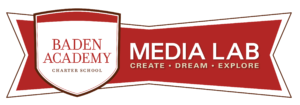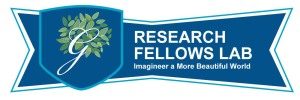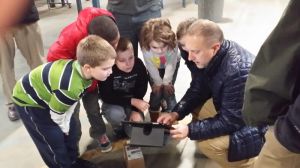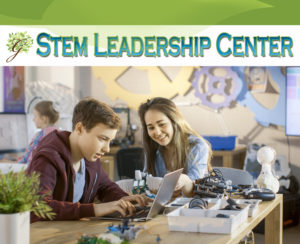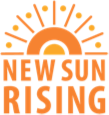Research Fellowship Applications are now open for Grades 3-16, student groups, and faculty!
Baden Academy Charter School Research Fellowship Application
Deadline is Tuesday, September 5, 9:00 am
Seton LaSalle Catholic High School Research Fellowship Application
Deadline is Monday, September 18, at 9:00 am
Grow a Generation Research Fellowship Application
Deadline is Friday, September 29, 2017
Amazing kids in grades 3 to 16, amazing faculty, gifted teachers, and community program coordinators have the opportunity to apply for a Research Fellowship and work hard to become a STEM Athlete, Digital Storyteller, and World Changer. Research Fellows are supported to design and follow through on robust and creative inquiries into what ignites their passion and celebrates their unique brilliance. They will produce meaningful projects and unique contributions that don’t simply add to their resume but engage them as autonomous and purposeful learners.
Fellows choose from diverse fields of study which pique their imaginations and resonate with their unique talents and individual passions. Their real-world project suggestions must make valuable contributions to the community that will be shared and disseminated with published materials, digital artifacts, and teaching opportunities.
WHAT IS A RESEARCH FELLOWSHIP?
Fellowships are year long projects (meeting about 60 minutes a week) that enable a student, group of students, teacher, or classroom to write a book, create a digital artefact, or compete in a national or international STEM competition. Fellowships end in an artefact (digital artifact) worthy of portfolios, college (or grant) applications Students have mentioned that the world seems so much bigger to them after they finish a fellowship. You are invited to apply to become one of these Research Fellows and work to become a STEM Athlete, Digital Storyteller, and World Changer. Research Fellows are supported to design robust and creative inquiries into new STEM frontiers that ignite their passion and celebrate their unique brilliance. They produce meaningful projects and unique contributions that don’t simply add to their resume but engage them as autonomous and purposeful learners.
We help you pick your topic! Fellows choose from diverse fields of study which pique their imaginations and resonate with their unique talents and individual passions. Their real-world project suggestions must make valuable contributions to the community that will be shared and disseminated with published materials, digital artifacts, competition entries, and teaching opportunities. A discussion with a fellowship coordinator allows us a chance to partner your interests with real world scientists, charitable organizations, and successful entrepreneurs looking to support students pursuing STEM.
Once accepted into the program, research fellows engage in projects that instill and strengthen a 21st-Century skill set of innovation, critical thinking, collaboration, emotional intelligence, resilience, leadership, and vision. A statement of goals and objectives is developed that identifies and applies skills and insights from multiple fields of study (e.g. science, technology, engineering, math, robotics, game design, medicine, energy, entrepreneurship, and leadership).
View of playlist of recent fellowship projects
MENTORS
Mentors from around the globe are solicited to assist our research fellows as they face the challenges of their project. Mentors communicate their own experience and take special interest in helping each fellow develop into a successful professional with unique interest and skills in their chosen field. Innovation Lab Research Fellows’ mentors are specifically expected to:
● Help the Research Fellow arrive at clearly stated goals and objectives of any proposed research projects;
● Monitor the fellow’s research experience at least once a quarter to discuss progress, results and plans for next steps;
● Participate as available in the completed projects celebrations in the press and in person.
Research and Teaching Mentors are also invited to join the fellows at an annual celebration at the end of the school year.
Past mentors include Dr. Teri Dankovich CEO Folio Water, the National Oceanic and Atmospheric Agency, RoPro Design, Software Engineers from Fed Ex, Beaver County Humane Society, ASPCA, Dream Flight Adventures, Beaver County Youth Entrepreneurship Network, Lincoln Learning Solutions, BeautyCounter, Park Rangers, Dr. Subha Das at CMU, Dr. Joseph Ayoob at University of Pittsburgh, Professors and Conservation Officers from New South Wales Australia, the Pittsburgh Zoo and PPG Aquarium, the Marine Mammal Center, Pittsburgh Filmmakers, the Epilepsy Foundation, Paws with a Cause, the Sisters of St. Joseph, Outreached Arms, Air Heritage Museum, Emergency Response Providers, RedMorph, Baden United Food Bank, We Schools, Future City, Future Engineers, TED-Ed Clubs, and FIRST Robotics.
TYPES OF RESEARCH FELLOWSHIPS
1. AUTHORS AND E-COMMERCE ENTREPRENEURS
Research Fellow authors create books with leading scientists, academics, and professionals about topics that inspire them. Once the books are written, student explore e-publishing, e-commerce and merchandising. Examples include:
● Anna Rutkowski, while a senior at Cardinal Wuerl North Catholic, partnered with Dr. Teri Denkovich, to write Nanoparticle Superheroes Defeat Evil Microbes. The book tells the story of Dr. Denkovich’s invention of a silver nanoparticle-infused paper that makes polluted water drinkable for, potentially, millions of children and families around the world.
● Gavin Phillips, now in 7th grade, has authored Saving a Galapagos Penguin Family and The Little Blue Penguins of North Sidney Harbour, and The King Penguins of the Falkland Islands. Proceeds from his books benefit the United States National Aviary, the Foundation for National Parks and Wildlife in Sydney Australia, and the Pittsburgh Zoo and PPG Aquarium. Mentors have worked with Gavin (online from around the world) to oversee the scientific and cultural accuracy of his children’s books.
● Jaylee Duncan, also in elementary school, partnered with the Marine Mammal Center to write Angie’s Tale: What Happened to Her Flipper? which tells the story of a heroic rescue of a sea lion, her amputation, and the concern of a community to set her back in the wild.
● Kindergarten teacher’s Kelli Keriotis’ students each claimed a unique historical Crayola color, began with paper and crayon drawings and went on to create with the RGB computer codes with Google Drawings. A Colorful Kindergarten illustrates their discoveries of color, its history and its expression. Her second book, Newton’s Prism, featured students in classical portraits of Sir Isaac and the historical figures in the discovery of light and color.
Books are published through Lulu, a print-on-demand site. Authors make commercials, create products such as tee shirts, 3-D printed figurines of their original artwork, and learn to submit press releases and hold book signings.
2. DIGITAL STORYTELLERS
Digital Storytellers create videos, vlogs, games, and animations to inform and inspire worthy work being done by non-profits, foundations, and amazing scientists around the globe (and in space!). Examples include:
● Anthony and Christopher are the MG Boys. They began two years ago by making videos and creating a website about molecular gastronomy called Lunch with Chemistry. This past year they made videos alongside Dr. Das from the Carnegie Mellon University Das Lab and the chef from the Fairport.
● Miriam and Jadyn are the Kitty Whisperers with their own YouTube Channel and the goal of raising awareness about the crisis of feral and free roaming cats. The students premiered their documentary on the Colony Cat program in Washington County at the International Animal Ethics Law Conference at Duquesne University.
● Music Educator Shundeena Beard developed her website UpBeat Animations and the tutorials on her site to help her students learn more about music theory as they animated their musical compositions. (Even teachers apply for research fellowships!)
● Kadie spent four years learning about entrepreneurship, e-commerce, and the profit margins of print on demand merchandise. She recruited a team and shares her expertise with all research fellows who want to branch out into entrepreneurship with her website badendreams.com. The website enables students and teachers to feature their artwork on posters, coffee mugs, iPad covers and key chains. The team is mentored by the Beaver County Youth Entrepreneurship Collaborative. The have learned how to digitize art and market it through a WordPress website.
● Kamryn’s website K2k Activities provides an online tool for parents and educators that wish to help older siblings and parents develop into positive role models and empathetic, dynamic leaders.
● Hannah Kimmick, a Kindergarten teacher, has been experimenting with 3-D printed alphabets produced in different fonts to see if the variety of letter shapes affect students’ learning of sight words. The project required her to learn Tinkercad 3-D modeling and print a complete set of Times New Roman and Arial shaped letters on the school’s 3-D printers. “I couldn’t have done it without all the student Future Engineers help!” Mrs. Kimmick explains to her students. You can find out more about her amazing project at KimmicksCharacters.weebly.com
3. STEM ATHLETES
STEM Athletes serve as the business and communication leaders of Engineering, Robotics, Game Design, and App Development team competitions. FIRST Robotics, STEM Video Game Design Competitions, Hackathons such as the Space Apps Challenge or the Mylan Hackathon, and programs such as the Real World Design Challenge provide an opportunity to for students to develop leadership and STEM skills. STEM Athletes are provided a mentor/coach for support and leadership training. Competition teams meet for the season and can be applied for as a group. Afterschool programs (programming, robotics, cyber security, game design) run for a school year.
- Five students from Cardinal Wuerl North Catholic contracted for a Verizon Innovative App Challenge Team. They met six weeks to learn some rudimentary programming, develop a mobile app concept, story board their app proposal, and film a mobile app pitch. The team won Best in State, then Best in Nation, winning over $20,000 for their school, tablets, and the opportunity to attend and present at the national TSA conference. Read more at cwncsafespeed.weebly.com
- Check out the film from last year’s Baden Academy Future Cities Competition Team where 10 students worked on virtual and real world artifacts to demonstrate their knowledge of civil engineering.
- The Baden Academy Nerd Battalion Leaders choose their curriculum each year and then recruit teachers to help! Last year focused on QWERTY keyboards and Arduinos.
- Teacher Amy Murray from Cardinal Wuerl North Catholic completed a fellowship which included developing a Zebrafish aquaria in her classroom, partnering with a mentor to help with embryonic research, and encouraging original research by her students to compete in the Pittsburgh Science and Engineering Fair (winning two sponsor awards).
- Future Engineers leaders helped 14 students submit competition entries to the NASA Future Engineers competition. Their video was featured on the national website.
MEETINGS
Research Fellows will meet weekly in small groups for discovery and collaboration. Fellowship projects must be completed and archived to present at the annual celebration. The first few sessions will include setting up a specific mission and the online files for correspondence. Fellows will have access to collaborative online tools, tutorial videos, and examples that enable them to work with a mentor to develop their idea or concept and set up a realistic timetable and steps needed to complete their project. Additional support is available during the week through email.
COSTS AND SELECTION
Some school districts will sponsor a limited number of fellowships or you can apply directly to Grow a Generation to become a research fellow. Prices start at $320 per month. The process for selection includes review by the Grow a Generation team, the faculty and administration of the school, and an interview. Individual meetings are recommended to create a winning proposal. Contact drellen@growageneration.com to schedule one.
APPLICATION PROCESS
The deadline for fellowship application packets varies. Use the links at the beginning of the post to look for upcoming deadlines for the 2017-18 school year. Scholarships and aid are available.

